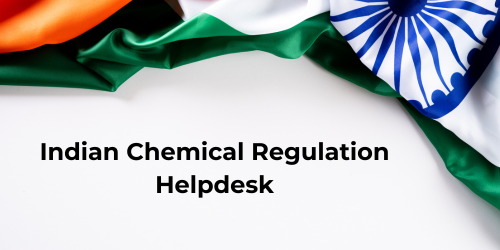Indian Chemical Regulation
India REACH (CMSR)
What is ICMSR (India REACH)?
The Indian Chemicals (Management and Safety) Rules (ICMSR) are a proposed set of rules replacing the current framework for chemicals management in India. As an overarching regulation, the ICMSR will regulate the production, import and market placement of Substances, Substances in Mixtures, Substances in Articles and Intermediates.
Current status of ICMSR
India released the fifth draft of the Chemical (Management and Safety) Rules (ICMSR) on August 24, 2020. The ICMSR is expected to be notified to WTO in 2022 and come into force after a process of legal vetting and ministerial feedback.
Who is concerned?
Indian manufacturers and importers are required to comply with the ICMSR, which also contains some obligations for Downstream Users.
Foreign entities wishing to place products in the Indian market should appoint an Authorized Representative (AR) to act and comply with the ICMSR on their behalf.
Notification is required for all substances that are in quantity above 1 Tonne Per Annum (TPA). Additionally, only substances that are listed in “Priority Substances Required to be Registered” in Schedule II of the ICMSR need to be registered.
What are the main obligations under ICMSR?
Notification
Notification is required for all substances placed in Indian Territory in quantities above 1 TPA.
The ICMSR will include an Initial Notification Period (INP) where manufacturers, importers and Authorised Representatives should notify their substances. The current Draft provides for an INP of 180 days, counting from the entry into force of the ICMSR. Substances notified during the INP will be considered Existing Substances.
Substances not notified during the INP will be considered as New Substances. If placed in the Indian market in quantities above 1 TPA, they must be notified at least 60 days prior to being placed in Indian Territory.
Registration
In addition to Notification, some substances will require Registration if placed in Indian Territory in quantities above 1 TPA. These substances will also require Registration when present in Articles from which they are intended or likely to be released in quantities greater than 1 tonne per producer or importer and year.
The ICMSR adopts a listing approach to Registration. All substances listed in Schedule II must be Registered within the 18 months following their inclusion in the Schedule.
Intermediates – substances that are manufactured for, consumed in, or used in chemical processing to be transformed into other substances – also incur Registration obligations, which vary according to their quantity and whether they are stored or transported.
Reporting
The information submitted at the time of Notification and Registration must be regularly updated.
An annual report must be set for all notified substances during the first 60 days of the calendar year. This report must include any changes to the information submitted at the time of notification, as well as the actual quantity of substances placed in Indian Territory (including any applicable fee changes).
Changes to the information submitted at the time of a Registration must, if they affect hazard or risk management, be notified within the 60 days after the registerer has become aware of the changes.
Compliance Strategies
In order to prepare for upcoming obligations under the ICMSR, businesses can:
Set up a regulatory team
Prepare an Inventory of substances being handled
Identify the quantity placed in India
Initiate communication with downstream users
Update SDS in accordance with GHS Rev. 8
Stay updated on the ICMSR
Hold internal training activities on the ICMSR
- Follow up on the relevant Schedules of the ICMSR substance list: Substances to be Registered (Schedule II), Restricted or Prohibited Substances (Schedule VI) and Hazardous Chemicals (Schedule X, XI, XII)




